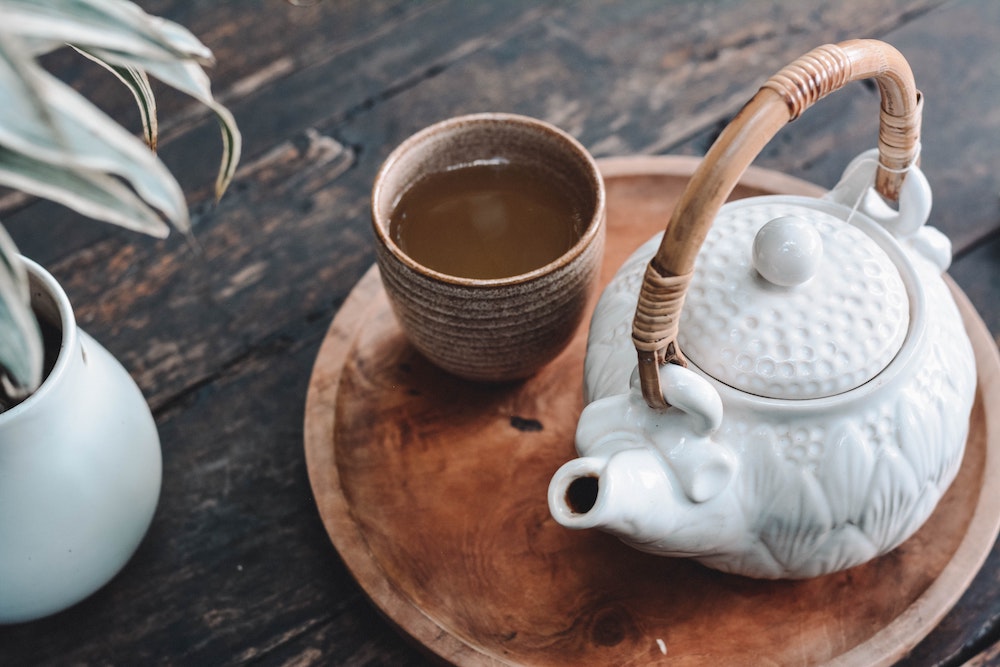How to Brew Pu-erh Tea (A Simple Guide for Tea Lovers)

How to Brew Pu erh Tea (A Simple Guide for Tea Lovers)
Pu-erh tea is a unique Chinese tea known for its rich flavor and potential health benefits.
Just as Hippocrates said, "Let food be thy medicine and medicine be thy food."
Pu-erh tea fits perfectly into this philosophy, offering a way to reWild your life and return to your human roots.
Different Pu-erh Tea Types
Before we dive into brewing methods, let's cover the two main types of pu erh tea:
- Ripe (Shou) Pu-erh: This tea undergoes fermentation, producing a dark, earthy flavor.
- Raw (Sheng) Pu-erh: Less processed, it has a lighter color and more astringent taste.
Both types can come as loose-leaf tea or pressed into a pu-erh cake.
How to Brew Pu-erh Tea: Step-by-Step Guide
Gather Your Equipment
To brew pu-erh tea, you'll need:
- A teapot or gaiwan
- A tea knife (if using a pu-erh cake)
- A scale or teaspoon
- Cups for serving
Prepare the Tea Leaves
- If using a pu-erh cake, carefully use a tea knife to break off about 3-5 grams of tea.
- For loose leaf pu-erh, measure 3-5 grams of tea leaves.
Heat the Water
Bring water to a boil. The ideal brewing temperature for pu-erh tea is around 95°C (203°F).
Rinse the Tea
- Place the tea leaves in your teapot or gaiwan.
- Pour a small amount of hot water over the leaves.
- Quickly discard this water. This rinse helps "awaken" the tea leaves.
First Infusion
- Pour hot water over the rinsed leaves.
- Steep for about 10-30 seconds, depending on your preference.
- Pour the tea into cups or a serving pitcher.
Subsequent Infusions
Pu-erh tea can be steeped multiple times.
For later infusions, gradually increase the steep time to extract more flavor.
Brewing Guide Table
| Tea Type | Water Temperature | Tea Amount | Steep Time | Number of Infusions |
|---|---|---|---|---|
| Ripe Pu-erh | 95°C (203°F) | 3-5g | 10-60 sec | 5-8 |
| Raw Pu-erh | 85-95°C (185-203°F) | 3-5g | 5-30 sec | 7-10 |
| Aged Pu-erh | 95°C (203°F) | 3-5g | 10-60 sec | 10-15 |
Wrapping Up
Brewing pu-erh tea is an art that rewards experimentation.
As you explore different brewing methods, you'll discover the rich world of flavors pu-erh has to offer.
Remember, at Wild Foods Co., we believe in the power of natural, whole foods to support your health.
Incorporating pu-erh tea into your daily routine is just one way to reWild your life and return to your human roots.
Ready to elevate your tea experience?
Check out our selection of high-quality teas and supplements at Wild Foods Co.
Our products are guaranteed to be free from artificial ingredients, gluten, soy, refined sugar, preservatives, and fillers.
Start your journey to better health today with Wild Foods Co.
FAQ: Common Questions About Brewing Pu-erh
How do I brew pu-erh in a regular teapot vs. a gaiwan?
Both methods work well for brewing pu-erh tea. A gaiwan offers more control over the brewing process, while a teapot is more convenient for significant amounts. Adjust the tea amount and steep time based on your vessel size.
What are the differences between brewing ripe and raw pu-erh?
Raw pu-erh generally requires lower water temperatures and shorter steep times than ripe pu-erh. Raw pu-erh is more sensitive to over-brewing, which can result in bitterness.
How do I break and prepare a pu-erh cake for brewing?
Use a tea knife to carefully pry off small chunks from the edge of the cake. Aim for 3-5 grams per session. Be gentle to avoid breaking the leaves too much.
Do you have any tips for brewing aged pu-erh tea?
Aged pu-erh often has a more mellow flavor. You may need to use slightly more leaf or extend the steep time to achieve the desired strength. Start with the recommended amounts and adjust to your taste.
How can I adjust the brewing for the desired strength?
To make your tea stronger, you can:
- Use more tea leaves
- Increase the steep time
- Raise the water temperature slightly
For a milder brew, do the opposite.
How should I store pu-erh tea, and how does it affect brewing?
Store pu-erh in a cool, dry place away from strong odors. Proper storage allows the tea to age gracefully, developing more complex flavors. Well-stored aged pu-erh may require longer, steep times to extract its flavors fully.
